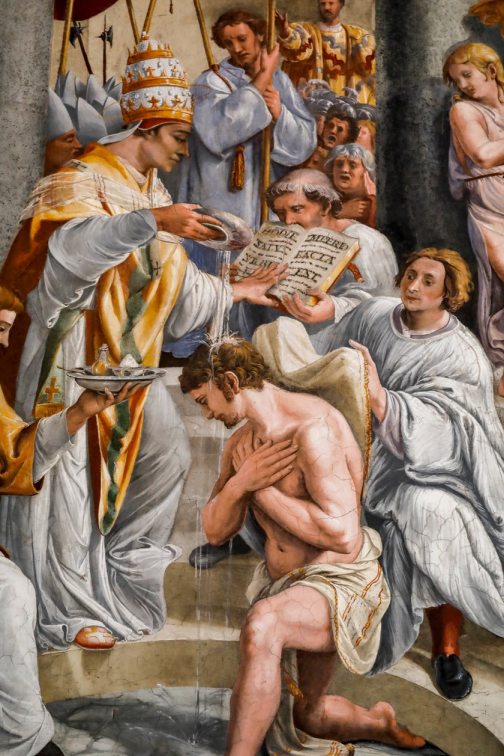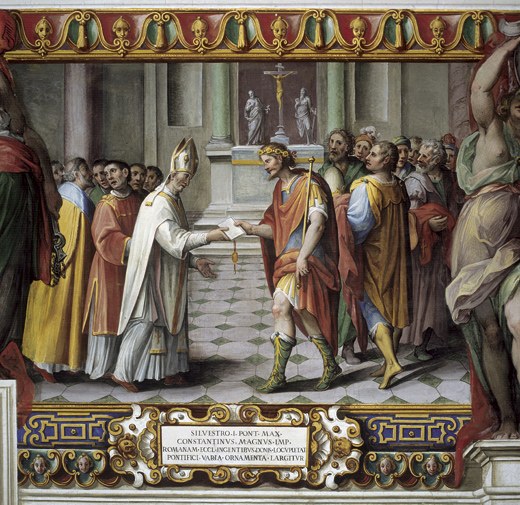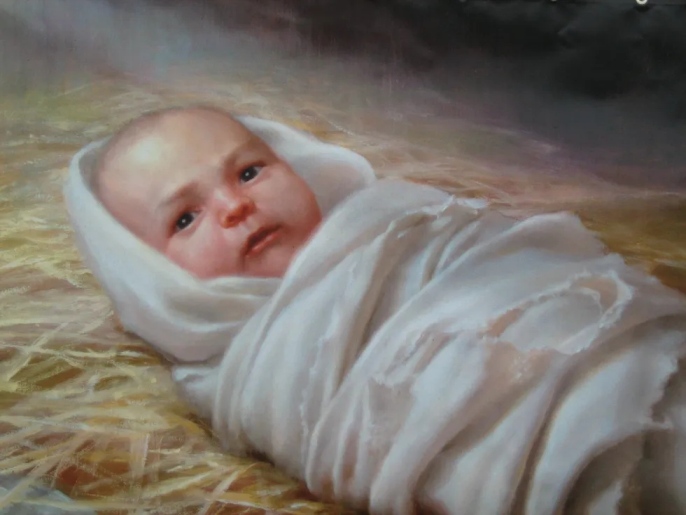The Traditional Catholic Liturgy
Adapted from The Liturgical Year by Dom Prosper Guéranger OSB.
Feast of St. Sylvester, Pope and Confessor († 335)
Seventh Day of the Christmas Octave – December 31
So far, the only ones we have seen standing round the Crib of our Jesus have been Martyrs: St. Stephen, overwhelmed by a shower of stones;
St. John, the Martyr in heart, who survived his fiery torture; the Holy Innocents, massacred by the sword; St. Thomas a Becket, murdered in his cathedral –
these are the champions of Christ, who keep guard in the palace of Bethlehem. Yet all Christians are not called to be Martyrs. Besides this countless battalion
of the King's favorite soldiers, there are other troops of sainted heroes which form the heavenly army; and amongst these there are the Confessors,
who conquered the world without shedding their blood in the combat. Though the place of honor in the service of the King belongs to the Martyrs,
yet did the Confessors fight manfully for the glory of His Name and the spreading of His Kingdom. The palm is not in their hands, but they are crowned with the crown of justice,
and Jesus, Who gave it to them, has made it part of His own glory that they should be near His throne.
The Church would therefore grace this glorious Christmas Octave with the name of one of Her children, who should represent at Bethlehem the
whole class of Her unmartyred Saints. She chose a Confessor – St. Sylvester: a Confessor who governed the Church of Rome, and therefore the universal Church;
a Pontiff whose reign was long and peaceful; a Servant of Jesus Christ adorned with every virtue, who was sent to edify and guide the world immediately after
those fearful combats that had lasted for three hundred years, in which millions of Christians had gained victory by martyrdom, under the leadership of thirty Popes –
predecessors of St. Sylvester – and they, too, all Martyrs.
So that St. Sylvester is messenger of the Peace which Christ came to give to the world, of which the Angels sang on Christmas Night.
He is the friend of Constantine; he confirms the Council of Nicaea; he organizes the discipline of the Church for the new era on which She is now entering – the era of Peace.
His predecessors in the See of Peter imaged Jesus in His sufferings; St. Sylvester represented Jesus in His triumph. His appearance during this Octave reminds us
that the Divine Child Who lies wrapped in swaddling clothes, and is the object of Herod's persecution, is notwithstanding all these humiliations, the Prince of Peace,
the Father of the world to come (Isa. 9: 6).
 Let us read the history of St. Sylvester's peaceful Pontificate, as related by the Church in Her Breviary. The character of our work excludes purely critical discussions,
and we, therefore, say nothing of the objections that have been raised against the Emperor Constantine's having received Baptism in Rome at the hands of St. Sylvester.
It is sufficient for us to tell our readers that the Roman tradition regarding that event has been adopted by the most learned men, such as Baronius,
Schelstrate, Bianchini, Marangoni, Vignoli, etc.
Let us read the history of St. Sylvester's peaceful Pontificate, as related by the Church in Her Breviary. The character of our work excludes purely critical discussions,
and we, therefore, say nothing of the objections that have been raised against the Emperor Constantine's having received Baptism in Rome at the hands of St. Sylvester.
It is sufficient for us to tell our readers that the Roman tradition regarding that event has been adopted by the most learned men, such as Baronius,
Schelstrate, Bianchini, Marangoni, Vignoli, etc.
St. Sylvester, a Roman by birth, and son of Rufinus, was brought up from childhood by the priest Cyrinus. He imitated his master by his learning and a good life,
and when in his thirtieth year, was ordained Priest of the holy Roman Church by Pope St. Marcellinus. He surpassed the rest of the clergy in the admirable manner wherein
he performed his sacred duties, and was chosen as the successor of Pope St. Melchiades, under the reign of the Emperor Constantine. This Emperor, having been advised
to seek the cure of his leprosy by bathing in infant's blood, was visited in his sleep by the holy Apostles Peter and Paul. They bade him refuse the sinful remedy
of the bath, if he desired to be cleansed from his leprosy, and go to St. Sylvester, who was then hiding on mount Soracte; that having been regenerated in the saving
waters of Baptism, he should give orders that the Churches, after the manner of the Christians, should be built in every part of the Roman Empire;
and that he should destroy the idols of the false gods, and worship the true God. Constantine therefore, obeying the heavenly admonition,
caused the most diligent search to be made for St. Sylvester, and ordered him, when found, to be brought to him.
This being done, and the Pontiff having shown Constantine the portraits of the two Apostles he had seen in his sleep,
the Emperor was baptized and healed, and became exceedingly zealous for the defense and propagation of the Christian religion.
By the persuasion of the holy Pontiff, Constantine also built several Basilicas, which he enriched with sacred images, and most princely donations and gifts:
he moreover granted permission to the Christians publicly to erect churches, which previously they were forbidden to do. Two Councils were held during the reign of this Pontiff:
firstly that of Nicaea, over which presided his Legates; Constantine was present, and 318 Bishops were assembled there; the Holy and Catholic Faith was explained,
and Arius and his followers were condemned; the Council was confirmed by St. Sylvester, at the request of all the Fathers assembled. The second was that of Rome,
at which 284 Bishops were present, and there again Arius was condemned.
Sylvester also passed several decrees most useful to the Church of God. For example: That the Chrism should be blessed by a Bishop only;
That the Priest should anoint the crown of the head of the person he baptized; That Deacons should wear Dalmatics in the church, and a linen ornament on the left arm;
That the Sacrifice of the Altar should be celebrated only upon a linen cloth. He laid down the length of time during which they who received Holy Orders should exercise
the functions belonging to each Order before passing to a higher grade. He made it illegal for a layman to be the public accuser of a cleric,
and forbade a cleric to plead before a civil tribunal. The names Saturday and Sunday were to be still used; but all the other days of the week were to be called Ferias
(Second Feria, Third Feria, and the rest) as the Church had already begun to call them; hereby signifying that the clergy should put aside all other cares,
and spend every day in the undisturbed service of God. To this heavenly prudence wherewith he governed the Church he ever joined the most admirable holiness of life
and charity toward the poor. For instance, he arranged that those among the clergy who had no means should live with wealthy members of the clergy; and again,
that everything needed for their maintenance should be supplied to Virgins consecrated to God. He governed the Church twenty-one years, ten months and a day.
He was buried in the cemetery of Priscilla on the Salarian Way. He seven times held ordinations in the month of December: the number of the ordained was forty-two Priests,
twenty-five Deacons, and sixty-five Bishops for various places.
Supreme Pastor of the Church of Christ! thou dost lend to the beauty of the holy Octave of Christmas the luster of thy glorious merits.
There thou dost worthily represent the countless Confessors, for it was thou didst steer the Bark of Peter after the three hundred years' tempest, leading Her with watchful
love in Her first hours of calm. The Pontifical Diadem, reflecting Heaven in its gems, sits on thy venerable brow. The Keys of the Kingdom of Heaven are in thy hands;
thou openest it for the admission of the Gentiles who embraced the Faith of Christ; thou shuttest it against the Arians, in that august Council of Nicaea,
where thou didst preside by thy Legates, and to which thou didst give thy authority, by confirming it with thy approbation. The furious storms will again soon rage against the Church,
and the angry billows of heresy will beat against Her; thou wilt then be in the bosom of God; but together with St. Peter, thou wilt guard over the purity of the Faith of Rome.
Thou wilt support Julius; thou wilt rescue Liberius; and St. Athanasius, aided by thy prayers, will find a shelter within the walls of Rome.

Under thy peaceful reign, Christian Rome receives the reward of Her long-endured persecution. She is acknowledged as Queen of Christendom,
and Her empire becomes the sole empire that is universal. The son of thy pastoral zeal, Constantine, leaves the city of Romulus, which has now become the City of Peter;
the imperial majesty would be eclipsed by that greater one of the Vicar of Christ; he makes Byzantium his capital, leaving Rome to be that of the Pontiff-King.
The temples of the false gods become ruins, and make room for the Christian Basilicas, in which are enshrined the Relics of the Apostles and Martyrs.
In a word, the Church has triumphed over the Prince of this world, and the victory is typified by the destruction of that Dragon which infected the air by its poisonous breath.
Honored with all these wonderful prerogatives, saintly Vicar of Christ! forget not the Christian people, which was once thy flock. It asks thee, on this thy Feast,
to make it know and love the mystery of the Birth of Jesus. By the sublime Creed which embodies the Faith of Nicaea, and which thou didst confirm and promulgate throughout
the whole Church, thou hast taught us to acknowledge this sweet Infant as God of God, Light of Light, begotten not made, Consubstantial with the Father.
Thou dost bid us to come and adore the little Child as He by Whom all things were made. Holy Confessor of Christ! vouchsafe to present us to Him, as the Martyrs have done,
whose feasts have filled up the days since His Nativity. Pray to Him for us, that our desires for true virtue may be fulfilled, that we may persevere in His holy love,
that we may conquer the world and our passions, and that we may at length obtain the Crown of justice, which is to be the reward of our confessing Him before men,
and is the only object of our ambition.
Pontiff of Peace! from the abode of rest where thou now dwellest, look down upon the Church of God, surrounded as She is by implacable enemies, and beseech Jesus,
the Prince of Peace, to hasten Her triumph. May She triumph over the wiles of political intrigue, the violence of tyranny, the craft of heretics, the perfidy of schismatics,
the apathy of worldlings, and the cowardice of Her own children. May She be honored, loved, and obeyed. May the spiritual power enjoy freedom of action.
May the civil authority work hand in hand with the Church. May the Kingdom of God now come, and be received throughout the whole world, and may there be but one Fold and one Shepherd.
O Holy Sylvester! keep watch still over the sacred treasure of the Faith, which thou didst defend when on earth against every danger.
May its light put out the vapors of man's proud dreams, those false and daring doctrines which mislead countless souls. May every mortal bow down his understanding to
the obedience of faith in the divine Mysteries, without which all human wisdom is but folly. May Jesus, the Son of God and Son of Mary, be King, by His Church,
over the minds and hearts of all men.
Pray for Byzantium (Turkey), that was once called the New Rome, but which so soon became the capital of heresies, and the scene of everything
that could degrade a Christian country. Pray that the days of her deep humiliation may be shortened; that she may again see herself united with Rome;
that she may honor Christ and his Vicar; that she may obey, and by her obedience be saved. May the people, misled and debased by her influence and rule,
recover their dignity as men, which can only subsist when men have faith, or be regained by a return to faith.
And lastly, O Conqueror of Satan! keep this hellish monster in the prison whither thou didst drive him; confound his pride and his schemes;
let him no longer seduce the people of God's earth; but may all the Children of the Church, according to the word of St. Peter thy predecessor, resist him,
by the strength of their faith (1 Pet. 5: 9).

Let us, on this Seventh Day within the Christmas Octave, consider the new-born Babe wrapped in the swaddling clothes of infancy.
They are the indications of weakness; the Child that is swathed in them is helpless, and dependent on others; another's hand must loosen His bands;
until then He is not free to move. It was in this infantine helplessness, and in the bondage of human weakness, that He Who gives life and motion
to every creature first appeared on our earth!
Let us contemplate Our Blessed Lady wrapping the limbs of Her Child, Her God, in these swathing bands: but who can picture to Himself the
respectful love wherewith She does it? She adores His humiliations – humiliations which he has taken upon Himself in order that He may sanctify every period of man's life,
even that feeblest of all, infancy. So deep was the wound of our pride, that it needed a remedy of such exceeding efficacy as this! Can we refuse to become as little children,
now that He Who gives us the precept sets us so touching an example? Sweet Jesus! We adore Thee wrapped in Thy swaddling clothes, and our ambition is to imitate Thy divine humility.
Let not,
says the holy Abbot Guerric, let not the eye of your faith be offended or shocked, brethren, at these outward humble coverings.
As the Mother of Jesus wrapped him in swaddling clothes, so do Grace and Wisdom, your spiritual mother, veil over with certain material things the truth of our Incarnate God,
and hide under the representation of symbolical figures the majesty of this same Jesus. When I, brethren, deliver to you, by my words, the Truth, which is Jesus,
I am swathing Jesus in bands of exceeding great poverty. Happy the soul that loves and adores its Jesus not the less because he receives Him thus poorly clad!
Let us therefore most devoutly think upon Our Lord clothed in infant limbs; that so, in the world of eternal happiness, we may see the glory and beauty wherewith
His Father hath clad Him; and this glory is that of the Only-Begotten Son of the Father
(Sermon V On Our Lord's Nativity).
Back to "In this Issue"
Back to Top
NEW: Alphabetical Index
Contact us: smr@salvemariaregina.info
Visit also: www.marienfried.com


 Let us read the history of St. Sylvester's peaceful Pontificate, as related by the Church in Her Breviary. The character of our work excludes purely critical discussions,
and we, therefore, say nothing of the objections that have been raised against the Emperor Constantine's having received Baptism in Rome at the hands of St. Sylvester.
It is sufficient for us to tell our readers that the Roman tradition regarding that event has been adopted by the most learned men, such as Baronius,
Schelstrate, Bianchini, Marangoni, Vignoli, etc.
Let us read the history of St. Sylvester's peaceful Pontificate, as related by the Church in Her Breviary. The character of our work excludes purely critical discussions,
and we, therefore, say nothing of the objections that have been raised against the Emperor Constantine's having received Baptism in Rome at the hands of St. Sylvester.
It is sufficient for us to tell our readers that the Roman tradition regarding that event has been adopted by the most learned men, such as Baronius,
Schelstrate, Bianchini, Marangoni, Vignoli, etc.

